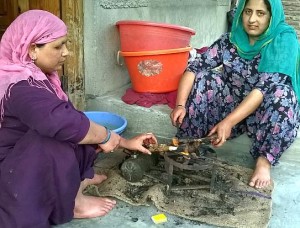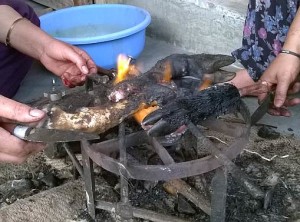Moral Timbers
One of the things we’ve enjoyed over our years of travel is watching for unique and humorous signs over shops and other public places. Near our former home in West Africa was the “Responsible Barber,” always reassuring. Here, commuting daily to language class we pass “Butt Footwear.”  On the outskirts of our little town is a lumberyard called “Moral Timbers.” “Moral fiber” is an English cliché which is sometimes tossed around but seldom examined. “Moral timber” sounds even heavier, more serious.
On the outskirts of our little town is a lumberyard called “Moral Timbers.” “Moral fiber” is an English cliché which is sometimes tossed around but seldom examined. “Moral timber” sounds even heavier, more serious.
Today is the first day of Ramadan, so perhaps “moral timber” is a relevant topic. Ramadan is the Muslim month of fasting and prayer, and here in this Muslim-majority community it is a very big deal. While Islam is the dominant religion, the structure of society is constructed with moral timbers of many different types—Hindu influence, English colonialism, political movements of various stripes, and more recently, Bollywood. It doesn’t take a construction worker to realize that timber from different trees, different ages, qualities, and sizes used in the same building may make for a shaky and shifting structure.
Ramadan is a time when Muslims fast during daylight hours in order to make up for sins they’ve committed, hoping to start fresh with a spiritually clean slate. It’s a good time to take a look at the moral timbers that structure our lives. I’d like to think that the timbers I’m building with are strong, and will weather well—better, anyway, than Butt Footwear!
Posted in Uncategorized and tagged Ramadan, timber by Lisa
Trapped in the Present Moment
Today is the three-month anniversary of our move to North India. A few moments ago I glanced up at the blank space on our wall above the desk, and realized that this is the longest period of time I can remember that we’ve lived without a calendar. We intended to buy one to put up, but in the busyness of shopping for household necessities, the calendar got put off until it seems every shop has run out. Of course, our computer and Indian smartphones remind us of the date, and we can pull up a calendar page on the screen easily enough. Somehow, though, those digital versions don’t give us the contextual sense of location in time that a paper calendar on the wall does. To be honest, one reason that we haven’t prioritized getting a calendar is that we wouldn’t have much to write on it! Since landing in India, we’ve made very few plans for the future. Aside from a weekly lunch meeting with our co-workers, our calendar would be blank.
A corollary to our lack of a calendar is our lack of verb tenses in our new language. While we’ve learned quite a bit of useful vocabulary, when it comes to verbs, we only know how to use the present tense. I can say, “I make tea in my kitchen,” or “I’m making tea right now.” But I’m unable to express whether I made tea yesterday or last month, or whether I ever will again. In my interaction with my new neighbors, I constantly bump up against the limits of the present, wanting to ask questions and talk about the past and the future, both mine and theirs.
Being trapped in the present moment is especially hard for us Americans, because we tend to be future-focused and calendar-conscious. As I sat with a neighbor over yet another cup of chai, I realized that I am being given an opportunity to practice the “sacrament of the present moment.” Can I resist the temptation to mull over the past or plan for the future and focus only on understanding and being understood by my new friend right now? Can I be fully attentive to the taste of the chai, the breeze coming in the window, and the thoughts we are trying to share? As I experience this calendar-less and tense-limited season of life, I’d like to be grateful for the gift of the present moment.
Posted in Uncategorized and tagged the present moment by Lisa
Love, Grammar, and Oxen
Written in tribute to my friend and fellow ESL teacher, Ellen H., with gratitude for her life and faithful example.
This morning as we were walking to our language lesson, we passed a field where a farmer was plowing behind a pair of oxen. We had only recently learned the word for “ox,” so we stopped to watch them. It’s a big boost to learning when new vocabulary comes to life!  This is the time of year when rice farmers cultivate their fields, flood them with water, and then transplant the small rice shoots into shimmering green rows. As the oxen turned the corner near us, we exchanged greetings with the farmer and then continued on our way.
This is the time of year when rice farmers cultivate their fields, flood them with water, and then transplant the small rice shoots into shimmering green rows. As the oxen turned the corner near us, we exchanged greetings with the farmer and then continued on our way.
I’ve been thinking a lot about grammar lately, because we’ve been running into challenges in our language learning- characteristics of this language that make it different from English, and in some cases different from any of the four languages we’ve studied. Even though she is well-educated, our language helper has never thought much about the underlying structure of her native language, so when we try to get her help in understanding these challenging characteristics, she feels nervous. She may have less-than-pleasant memories of studying English grammar in school! She isn’t alone in her anxiety about grammar; many people, speaking many different languages, share her feelings.
Grammar is essentially the underlying patterns that people use when they communicate; most people don’t think much about it when they’re speaking their native tongue. But in learning a new language, understanding those patterns becomes very important. Grammar enables me to say, “Those are sheep feet you’re cooking!” instead of, “Those sheep are cooking your feet!” Sometime soon, I will use grammar patterns to say, “You look worried. Is there something wrong? Can I pray for you?”
After our language lesson I was reflecting on grammar and its uses, and we passed the rice field again. That’s it, I realized– grammar is like an ox! It’s powerful, and it can do hard work for us, but it can also be scary and destructive if it’s let loose in the wrong place! Like an ox, grammar is a domestic animal; trained and yoked, it can help us do more in our work of communication than we could do without it. But the yoke is built for two animals. What should be yoked beside grammar in order to plow straight furrows of real communication?
Love. When love and grammar are yoked together, they can work side by side and lead me forward in plowing deep furrows of communication with my new neighbors. In that fertile soil I can plant seeds of understanding. And I’m looking forward to a rich crop of relationships!
Posted in Uncategorized and tagged grammar by Lisa
Sheep Feet on the Fire
This afternoon brought another new experience. I paid a visit to our next-door neighbors; although I’d been admiring their garden from our bedroom window, I hadn’t met them yet. I found the women on their back porch, roasting sheep feet over a little gas burner!  It looked messy and smelled disgusting, but I was curious, and went over and sat with them. They started by singeing off the hair, then scraped off the burned skin. After trimming off other unwanted bits, they tossed the cleaned and toasted bones into a big pot, along with small pieces of meat. (There seemed to be some prized meat between the “toes.”) There were at least 20 feet in the pot by the time they were done.
It looked messy and smelled disgusting, but I was curious, and went over and sat with them. They started by singeing off the hair, then scraped off the burned skin. After trimming off other unwanted bits, they tossed the cleaned and toasted bones into a big pot, along with small pieces of meat. (There seemed to be some prized meat between the “toes.”) There were at least 20 feet in the pot by the time they were done.
 There were no English-speakers among the women, so I had to rely completely on my two months’ worth of local language. I tried to find out how the sheep feet would be cooked, and got the general idea that it involved onions and a long time. I was able to communicate that I was the one who looked down from the window next door, and they had lots of questions for me. I understood many of them, and was able to answer a few. They seemed pleasantly surprised that I would come and sit with them over an unpleasant job.
There were no English-speakers among the women, so I had to rely completely on my two months’ worth of local language. I tried to find out how the sheep feet would be cooked, and got the general idea that it involved onions and a long time. I was able to communicate that I was the one who looked down from the window next door, and they had lots of questions for me. I understood many of them, and was able to answer a few. They seemed pleasantly surprised that I would come and sit with them over an unpleasant job.
There was one question that they asked me several times, and I could only shake my head and reply, “I don’t understand.” Later that evening, while I was reviewing my language lessons, I realized what they had been asking. It was, “Do you want to taste it?” I’ve sampled a wide variety of new and strange foods over the years, and almost never regretted it. This time, I had missed my chance! Now I know what that phrase means, and the next time I’m asked, I’m going to say “Yes!”
Posted in Uncategorized and tagged sheep feet by Lisa
From Friend to Family
A few weeks ago, I wrote about Shahaz, my first local friend. I went to see her again a few days ago, on an afternoon when I was feeling tired of language review and a bit lonely. When I arrived at her door, instead of showing me into the sitting room, she brought me into a bedroom, where her daughter was ensconced among the blankets with a new baby! A small crowd of women were also there, seated on the floor near the bed. Shahaz seemed so excited as she introduced me to the other women, who I learned were “the aunties,” her sisters and cousins.
I sat on the floor with them and Shahaz produced a cup of chai and a plate of food for me, and proudly explained to the aunties that I knew how to eat with my hands! They began discussing me in the local language—where I was from, where I lived, how I was trying to learn their language–and I was delighted to find that I could follow a bit of what they were saying. At one point they began pointing at me and at one another and laughing, and I asked Shahaz’s younger daughter (who speaks English well) what they were saying. She replied, “They’re talking about how thin you are and how fat they all are!” More laughter all around!
I asked the aunties where they lived, and they told me that they lived nearby in the next town over. My loneliness surfaced, and I said to them, “It’s so nice to have your family all living close by. My family is far away.” Shahaz’s daughter immediately replied, “Don’t worry! We are your family now!” The aunties all smiled and nodded, and I felt their affection fill my heart like the hot chai in my cup.
Before saying good-bye, I sat on the bed for a few minutes and held the new baby, a little girl. I said a prayer for her and made my best attempt at a blessing in my new language. This baby girl is blessed already, to be part of a loving, caring family—one that I am now part of, too.
Posted in Uncategorized and tagged family by Lisa

